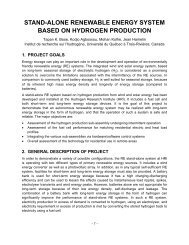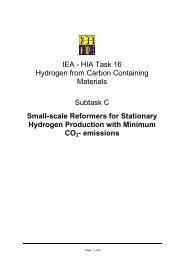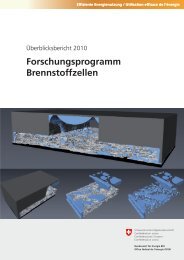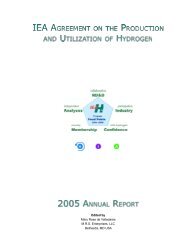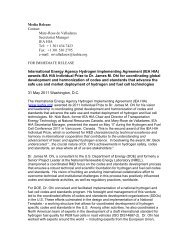Technology Status of Hydrogen Road Vehicles
Technology Status of Hydrogen Road Vehicles
Technology Status of Hydrogen Road Vehicles
Create successful ePaper yourself
Turn your PDF publications into a flip-book with our unique Google optimized e-Paper software.
8.4 The cost <strong>of</strong> liquefying hydrogen<br />
The cost <strong>of</strong> liquefaction depends on the cost <strong>of</strong> delivered electricity ($14.65-16.41 per mmBtu in near term,<br />
3.50-5 for transmission plus 18-45 for solar power in middle term), the efficiency <strong>of</strong> liquefaction (26-33%),<br />
and the non-energy cost <strong>of</strong> liquefaction ($2-4 per mmBtu).<br />
.......<br />
(Some doubt for the present writer surrounds these summary figures, and DeLuchi does not quote explicitly<br />
in his text the resulting cost <strong>of</strong> liquefaction; a Table however gives the liquefaction cost as $9.42(high)-<br />
5.81(low) per mmBtu in near-term, and $20.50(high)-7.59(low) in middle-term.)<br />
8.5 Refueling station cost and fuel taxes<br />
A hydride refueling station is assumed to serve 200 vehicles per day over 18 hours, and each vehicle (210 km<br />
range) withdraws 82% <strong>of</strong> its full 0.426 mmBtu capacity. Pipeline hydrogen would probably have to be<br />
purified at the station before delivery to vehicles (hydrides require >99.995% purity). Allowing for the costs<br />
<strong>of</strong> compression to 200 bar and <strong>of</strong> personnel, the total hydride station mark-up would be $3-4 per mmBtu.<br />
LH 2 refueling station costs are the sum <strong>of</strong> delivery and retailing costs. Truck delivery <strong>of</strong> LH 2 to most<br />
metropolitan areas is taken as $0.50-1.50 per mmBtu, and boil<strong>of</strong>f reduces the amount transferred at each step<br />
to 87-92%.....Taking known costs <strong>of</strong> LNG refueling stations with appropriate corrections, an LH 2 station cost<br />
<strong>of</strong> $4-5 per mmBtu is reached.<br />
Regarding state and federal taxes, it is assumed that the tax-per-km would be 100% <strong>of</strong> the gasoline one in the<br />
near term, and anywhere from 50 to 100% <strong>of</strong> the gasoline one in the medium term.<br />
8.6 The effect <strong>of</strong> thermal efficiency, vehicle weight and pollution control equipment on vehicle life-cycle cost<br />
These three items directly affect the km per mmBtu <strong>of</strong> both hydrogen and gasoline vehicles. ....It is assumed<br />
that most H 2 vehicles would be run fairly lean, with 20-45% more thermal efficiency for LH 2, and 20-42% for<br />
hydride vehicles.....A typical, full, advanced LH 2 tank would weigh about 10 kg more than the full gasoline<br />
tank it would replace, in 420-km range vehicles, and would be compensated by the pollution control<br />
equipment not needed. The extra weight <strong>of</strong> the hydride vehicle would be 200-260 kg compared to the gasoline<br />
vehicle. Pollution control equipment on the gasoline vehicle can be ignored, as far as weight effects are<br />
concerned, as various factors balance out.<br />
8.7 The price <strong>of</strong> the vehicle<br />
Concerning engine equipment it can be assumed that both hydride and LH 2 engines would be about $50-200<br />
more expensive than a comparable gasoline engine, allowing for fuel induction, injection and backfire control<br />
in the former.<br />
Concerning engine size, advanced LH 2 engines will be at least as powerful as gasoline engines <strong>of</strong> similar<br />
size....And since LH 2 vehicles will not be heavier, it is assumed that there is no cost difference due to engine<br />
size between an optimized LH 2 engine and a gasoline engine providing the same performance.<br />
.......<br />
Rather than attempt to estimate the additional cost <strong>of</strong> bringing the performance <strong>of</strong> the hydride vehicle up to<br />
the level <strong>of</strong> the gasoline vehicle, assume no cost difference, and note that performance would not be<br />
comparable.<br />
Concerning pollution control equipment , hydrogen vehicles would not require a 3-way catalytic converter,<br />
start-up catalyst, oxidation catalyst, oxygen sensor, evaporative emission control, air injection, exhaust gas<br />
50



